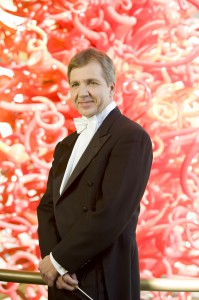PARADIGM CHAMBER ORCHESTRA, Libby Gardner Concert Hall, Sept. 20
For its first concert of the new season, the Paradigm Chamber Orchestra focused on works from the classical and baroque eras. It was a well chosen program, and the ensemble, under music director Joel Rosenberg, played with polish and finesse.
Except for a pair of works, the concert was also a showcase for two of the group’s members: bassoonist Robert Bedont and flutist Tia Jaynes, both of whom are also members of Rosenberg’s American West Symphony.
Bedont gave a wonderfully clean and well articulated account of Vivaldi’s Concerto for Bassoon in A minor, RV. 498. He brought lyricism and finely crafted expressions to his playing and showed that the bassoon is indeed a remarkable melody instrument. The orchestra also played with expressiveness, and Rosenberg made sure there was a good balance between the soloist and the string ensemble.
Jaynes was featured in two pieces, the “Dance of the Blessed Spirits” from Gluck’s opera Orfeo ed Euridice and the Badinerie from J.S. Bach’s Orchestral Suite No. 2 in B minor.
The former is a calm, reflective piece and Jaynes captured the mood with her lyrical playing, while in the latter she let loose with some impressive bravura playing.
University of Utah pianist Heather Conner joined Rosenberg and the ensemble for an excellent performance of J.S. Bach’s Keyboard Concerto in D minor, BWV 1052. Conner played with fluid lines and seamless phrasings and brought nuance to her account. Rosenberg elicited articulate and cleanly phrased playing from the strings. It was a stand out virtuosic performance by both the soloist and the ensemble.
Also on the program were two early Mozart works, the Divertimento in F major, K. 138, and the Symphony No. 23 in D major, K. 181. Both were played with lyricism, finely molded phrasings and crisp articulation. In the K. 181, principal oboe Robin Vorkink played her solo in the Andante grazioso with polish and beautiful expressiveness.


